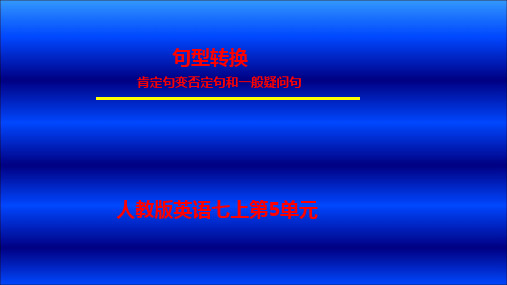七年级英语一般疑问句课件ppy
合集下载
初中英语 人教版七年级上册Unit5 肯定句改为否定句和一般疑问句课件

保镖法
eg: He likes bananas.(改为否定句)
He d_o_e_s_n_’__t_ __li_k_e_____ bananas?
第三人称单数胆子小, 出门需要带保镖
保镖开路,原形毕露
谓语动词是实义动词-------肯定句变一般疑问句
方法
主语第三人称单数 主语非第三人称单数
在句首加Does 在句首加Do
保镖开路,原形毕露
练一练
1 .My mother comes from Jiangsu.(改为否定句) My mother __d__o_e_s__n_’_ t co__m__e__ from Jiangsu.
2 They like swimming.(改为否定句) They ___d_o__n_’__t_ __li_k_e_____ swimming.
句型转换
肯定句变否定句和一般疑问句
人教版英语七上第5单元
目
根据谓语动词把句子分类 谓语动词是be动词怎么变否定句和一般疑问句 谓语动词是实义动词的怎么变否定句和一般疑问句的心脏
1. She is a student. 2. They are from China.
谓语动词是be动词
√ I'm not a boy. × I amn’t a boy.
e.g He is from China.(改为否定句) He is not from China.
He isn't from China.
谓语动词是be 动词-------肯定句变一般疑问句
方法
一提 二改
把be提前 第一人称改第二人称
保镖开路, 原形毕露
保镖开路,原形毕露
变否定句和一般疑问句方法
最新人教版七年级英语语法总结(精品)PPT课件

母,应先双写这一辅音字母,再加ed 如 stop---stopped
4)以辅音字母+结尾的动词,先变 “y”为 “i”,再+ed 如 study—studied cry---crie
祈使句的复习建议:
掌握祈使句的基本用法和基本形式: 1) 省略第二人称主语 you. 2) 祈使句的肯定形式:Do/Be 开头;
2. 不定冠词a /an 的位置:
a / an 除了位于名词短语之首之外,还有几种特例:
否定祈使句: Don’ t do / Don’ t be开头 3) 为表示礼貌,祈使句前或句末可加please.
句末用please时,please前用“,”隔开。
祈使句的基本含义: 表示请求、命令、劝说、号召、警告等。
1.Turn left on First Avenue and enjoy the city’s quiet streets and small parks
1) 泛指某人或某物 。如 Then an idea occurred to me.
2) 代表一类人或物,但没有one强烈 。 An elephant is heavier than a horse .
3) 用于某些词组或成语中。 As a matter of fact , I don’t like the story.
现在进行时讲解: 表示: 说话瞬间或现阶段正在进的动作。
(时态可以通过动词的变化形式来表示)
I am watching TV. The students are studying for the exams. She isn’t writing a letter now Is Nancy doing her homework? What are you doing now?
4)以辅音字母+结尾的动词,先变 “y”为 “i”,再+ed 如 study—studied cry---crie
祈使句的复习建议:
掌握祈使句的基本用法和基本形式: 1) 省略第二人称主语 you. 2) 祈使句的肯定形式:Do/Be 开头;
2. 不定冠词a /an 的位置:
a / an 除了位于名词短语之首之外,还有几种特例:
否定祈使句: Don’ t do / Don’ t be开头 3) 为表示礼貌,祈使句前或句末可加please.
句末用please时,please前用“,”隔开。
祈使句的基本含义: 表示请求、命令、劝说、号召、警告等。
1.Turn left on First Avenue and enjoy the city’s quiet streets and small parks
1) 泛指某人或某物 。如 Then an idea occurred to me.
2) 代表一类人或物,但没有one强烈 。 An elephant is heavier than a horse .
3) 用于某些词组或成语中。 As a matter of fact , I don’t like the story.
现在进行时讲解: 表示: 说话瞬间或现阶段正在进的动作。
(时态可以通过动词的变化形式来表示)
I am watching TV. The students are studying for the exams. She isn’t writing a letter now Is Nancy doing her homework? What are you doing now?
人教版新目标英语七年级上册unit1全单元课件(共89张PPT)

Grammar
人称代词:
I you
he she it we they
我 你\你们 他
她 它 我们
他们
形容词性物主代词:
My your his her its our their
我的 你、你们的 他的 她的 它的 我们的 他们 的
人称代词主格做主语 ,常用于句首。
形容词性物主代词 形容词性物主代词起形容词作用,它后
Hello! My name is Bingo. Nice to meet
you!
Hello, I’m Jack. What’s your name?
My name is Jane.
询问别人名字的时候可以说: What’s your name?
介绍自己姓名的时候既可以用 I’m…也可以用My name is …。 I’m Gina. = My name is Gina.
Well begun is half done. Go for it, boys and girls! You can do it
Gramm一般疑问句)
Yes, he is.
(肯定回答)
No, he isn't.
(否定回答)
His name's Mary. (补充说明)
Are you Ms. Miller? Yes, I am. / No, I'm not. 4. This is a ruler.
Is this a ruler? Yes, it is. / No, it isn't.
Exercises: 对划线部分提问
1. My name's Gina. __W_h_a__t'_s __y_o_u_r_ name?
初中英语-疑问句专项练习(一般疑问句、特殊疑问句)精品课件

20. He will be back in four days .
_H__o_w__s__o_o_n__w__il_l _h_e__b_e__b_a_c__k_?______________________
21. The book is Li Hua’s.
_W__h__o_s_e__is__t_h_e__b_o_o__k_?_____________________________
22. They are five yuan .
_H__o_w__m__u__c_h__a_r_e_t_h_e_y__?____________________________
23. I wash it twice a week .
_H__o_w__o__ft_e_n__d_o__y_o__u__w_a_s__h_i_t_?______________________
14. I am looking for my sister .
_W__h_o__a_r_e__y_o_u__l_o_o_k_i_n_g__f_o_r_?________________________
15. I get up at six .
_W__h_e_n__d_o__y_o__u__g_e_t_u__p_?____________________________
that time? Mum: It’s very cold. Millie:W__h_e_r_eare we going to stay in Harbin? Mum: In Grandma’s big house. Millie: W__h__a_t does Grandma like eating? Mum: She likes biscuits very much. Millie: _W__h_y_do we need that big bag? Mum: Because we need to take lots of things
_H__o_w__s__o_o_n__w__il_l _h_e__b_e__b_a_c__k_?______________________
21. The book is Li Hua’s.
_W__h__o_s_e__is__t_h_e__b_o_o__k_?_____________________________
22. They are five yuan .
_H__o_w__m__u__c_h__a_r_e_t_h_e_y__?____________________________
23. I wash it twice a week .
_H__o_w__o__ft_e_n__d_o__y_o__u__w_a_s__h_i_t_?______________________
14. I am looking for my sister .
_W__h_o__a_r_e__y_o_u__l_o_o_k_i_n_g__f_o_r_?________________________
15. I get up at six .
_W__h_e_n__d_o__y_o__u__g_e_t_u__p_?____________________________
that time? Mum: It’s very cold. Millie:W__h_e_r_eare we going to stay in Harbin? Mum: In Grandma’s big house. Millie: W__h__a_t does Grandma like eating? Mum: She likes biscuits very much. Millie: _W__h_y_do we need that big bag? Mum: Because we need to take lots of things
初中英语零基础学语法--疑问句ppt课件

attention
• 1.回答特殊疑问句时,不能用yes / no,即问 什么答什么,尤其是简略回答。如: • Who is from Canada? • Helen (is). • Where's the restaurant? • Near the station. • Why do you like koalas? • Because they are cute. 2.特殊疑问句一般读降调(↓)。
初中英语零基 础学语法--疑 问句
返回
ห้องสมุดไป่ตู้ 一般疑问句
一般疑问句也可称为 “yes / no 疑问句”,因这 种问句通常用yes / no来回答,相当于汉语中的 “……吗?” 语序:系动词be / 助动词/ 情态动词+主语+其 他成分? I am from Japan. ---Are you from Japan? ---Yes I am. / No I’m not.
返回
2.陈述句中有情态动词或助动词(can may must …)时,也可直接将它们提至主语前,即可成 为一般疑问句。如: He can swim now. →Can he swim now? The children may come with us. → May the children come with us? I have finished my work. →Have you finished your work ? 返回
返回
(一)、 简单句式结构中反意疑问句的运用
• 反意疑问句运用于简单句式结构中时,我 们应注意掌握以下几个方面 • 1、当陈述句部分的主语是名词时,反意 疑问句的主语必须用人称代词来代替。 • Your brother has gone to the library, hasn’t he? 你弟弟去图书馆了,是吗?
七年级英语上册 助动词do does的用法课件 人教新目标版(共13张PPT)

原。), 划线部分去掉. I ________( don’t /doesn’t)play sports.
否定句:主+ don’t/doesn’t+动原+其它 doesn’t
What do you like ?你喜欢什么? (二)(does) 若是主语为三单, 陈述句中动变形, 一般疑问也简单, does放在句子前, 否定doesn’t实动前, 主动出现动还原。
助动词do/does的用法 — _______ , ________ _______. I ________( don’t /doesn’t)play sports.
__D_o_e_s_ Tom ____li_k_eapples? 助动词do/does的用法
don’t like 我喜欢这件蓝色的毛衣。
What do you like ?你喜欢什么? 含有实义动词的句子,进行句子转换时应借助于助动词do/does,主语是三单(he,she,it)时用does,其他用do。
(do/does提前,其它照抄不变,动词还 No,主+ don’t/doesn’t.
My parents________( don’t /doesn’t) want to watch TV. Jenny has a ping-pong bat.
Tom likes English.
一般疑问句:do/does提前,其它照抄不变
(Do /Does+主+动原+其它?),一人称变二 人称。回答:Yes,主+do/does. No,主+ don’t/doesn’t.
Do you like this blue sweater?Yes, I do. / No, I don’t.你喜欢这件蓝色的毛衣吗?是的,我喜 欢; 不,我不喜欢。
否定句:主+ don’t/doesn’t+动原+其它 doesn’t
What do you like ?你喜欢什么? (二)(does) 若是主语为三单, 陈述句中动变形, 一般疑问也简单, does放在句子前, 否定doesn’t实动前, 主动出现动还原。
助动词do/does的用法 — _______ , ________ _______. I ________( don’t /doesn’t)play sports.
__D_o_e_s_ Tom ____li_k_eapples? 助动词do/does的用法
don’t like 我喜欢这件蓝色的毛衣。
What do you like ?你喜欢什么? 含有实义动词的句子,进行句子转换时应借助于助动词do/does,主语是三单(he,she,it)时用does,其他用do。
(do/does提前,其它照抄不变,动词还 No,主+ don’t/doesn’t.
My parents________( don’t /doesn’t) want to watch TV. Jenny has a ping-pong bat.
Tom likes English.
一般疑问句:do/does提前,其它照抄不变
(Do /Does+主+动原+其它?),一人称变二 人称。回答:Yes,主+do/does. No,主+ don’t/doesn’t.
Do you like this blue sweater?Yes, I do. / No, I don’t.你喜欢这件蓝色的毛衣吗?是的,我喜 欢; 不,我不喜欢。
初中英语疑问句一般疑问句特殊疑问句
Will it rain this afternoon
1. I like English. Do you like English
2. Eddie played football. Did Eddie play football
一般疑问句的肯定回答、否定回答。
肯定回答:Yes,… +关键词。 否定回答:No,…+关键词+not.
8.I’ll bring it here in a minute.
How soon will you bring it here
Exercises :针对下列划线部分提问
• 1.We are going to Hainan Island. Where are you going
• 2.Chinese New Year this year is in February. When is Chinese New Year
Susan: _S_o_m__e_ of them are from Lianhua Supermarket and _s_o_m__e_ from Xixi shop.
Tom: Could you buy _s_o_m__e_ for me I also need s_o_m__e__
but I am very busy today.
想想还缺了哪个疑问词呢
Let’s see the family of “how”
1. I go to school by bus.
How do you go to school
2. She is twelve.
How old is she
3. Jim plays with his dog for about two hours on Sunday.
1. I like English. Do you like English
2. Eddie played football. Did Eddie play football
一般疑问句的肯定回答、否定回答。
肯定回答:Yes,… +关键词。 否定回答:No,…+关键词+not.
8.I’ll bring it here in a minute.
How soon will you bring it here
Exercises :针对下列划线部分提问
• 1.We are going to Hainan Island. Where are you going
• 2.Chinese New Year this year is in February. When is Chinese New Year
Susan: _S_o_m__e_ of them are from Lianhua Supermarket and _s_o_m__e_ from Xixi shop.
Tom: Could you buy _s_o_m__e_ for me I also need s_o_m__e__
but I am very busy today.
想想还缺了哪个疑问词呢
Let’s see the family of “how”
1. I go to school by bus.
How do you go to school
2. She is twelve.
How old is she
3. Jim plays with his dog for about two hours on Sunday.
七年级英语一般疑问句和特殊疑问句
◦3.加doesn't/ didn’t的句子注意,句子动词要变成原 型。
精选ppt
17
观察一下,这些肯定
句变成一般疑问句的 规律是怎么样的?
精选ppt
18
肯定句: ◦They are in the park. ◦一般疑问句: ◦ Are they in the park?
◦
精选ppt
19
Be 型esentation
There is not a big clock.
2.This is my bag. This is not my bag.
3.I am a student I am not a student.
句中有be(am is are)动词, 变否定句时, 需要 在( be )后加not.
精选ppt
5
◦情态动词
◦2. I go to see my parents once a month. _________________________________
◦3. She needs some masks. _________________________________
◦4. They like making the puppet. ______________________
精选ppt
27
◦ 1.Sarah can clean the classroom. ________________________________________
◦ 2.You can do it.
◦ ________________________________________ 3.He can cook the meal.
◦We don’t learn English at one.
英语一般疑问句和特殊疑问句PPT讲稿
1 当画线部分是句子的主语,挑选适当特 殊疑问词即可,不做其它变化。 Jenny has a lovely pet. Who has a lovely pet ?
由一般疑问句引出疑问代词
• She is a teacher.
Is she a teacher? Who is she?
• This is a chair.
Is this a chair? What’s this?
• I go to bed at eight o’clock.
Do you go to bed at eight o’clock? When do you go to bed?
情态v: can, could,may, might, will, shall,would, must, need, should, …
助动词: do does did has/have(已经)
• 一般疑问句常用Yes或No回答.
• 其完整形式 :
• 肯定回答:
• Yes,主语+be (情态动词、助动词)
英语一般疑问句和特殊疑问句 课件
一般疑问句
• 主要由be动词、情态动词或助动词来开头。
(1) Is Han Mei in Class Four? (2) Can you spell your name, please? (3) Does he go to school every day?
be动词: am, is, are, was, were
特殊疑问句 = 特殊疑问词 + 一般疑问句
特殊疑问句
1. 含义:特殊疑问句是指以 Wh-
(How)等特殊疑问词开头,对陈 述句中某一部分提问的句子。回答时 不用Yes/No,而是用一个句子或短语 回答。 2. 结构: 特殊疑问句= 特殊疑问词 + 一般疑问句
初中英语语法课件 句子的种类之一般疑问句
Does she have a computer? 她有一台电脑吗?
助动词 do 要随人称和时态而变化。 在一般现在时中,除第三人称双数 用 does 外,其他人称用 do。而 在一般过去时中,任何人称皆用 did。异时,还应注意把本陈述句 的行为动词改为动词本形。
3. 情态动词 + 主语 + 谓语 +…
含有连系动词be的未来时(shall / will + be) 或完成 时态(have / has + been) 的句子,改为一般疑问句 时,只需将shall / will 或have / has提到句首。 Will they be at home tonight? 他们今晚在家吗? Has he been to New York? 他去过纽约吗?
4.Have / Has + 主 语 + 过去分词 +…
Have you heard from him? 你收到他的来信吗?
Has he finished his homework? 他完成了家庭作业吗?
现在完成时的一般疑问句句型。have / has 在此作助动词,没有实际意义。在美国英语 中,无论 have 表示“有”或用作行为动词, 其一般疑问句皆要借助于助动词 do 的适当 形式。而在英国英语中,只有当 have 作行 为动词时,其一般疑问句才要作助动词 do 的适当形式。
Is this your skirt? 这是你的短裙吗? Yes, it is. Is the cinema next to the library? 电影院与图书馆相邻吗? Yes, it is.
Have they been to New York? 他们去过纽约吗?
Yes, they have.
